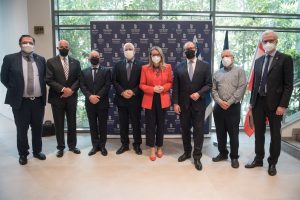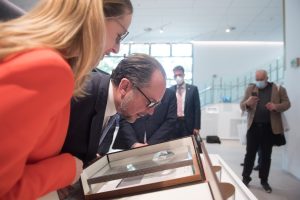Technion, Austria to Collaborate on Digital Health
Two senior Austrian Ministers visiting Technion, impressed by achievements; emphasized the need for cooperation in the fields of medicine and AI
On March 30, a large Austrian delegation visited the Technion, headed by Ms. Margarete Schrambock, Federal Minister for Digital and Economic Affairs, and Mr. Alexander Schallenberg, Federal Minister for European and International Affairs, and accompanied by the Austrian Ambassador to Israel.

The Austrian delegation with Technion President Prof. Uri Sivan and Technion Executive Vice President & Director General Prof. Boaz Golany
Arriving at the Technion by cable car, the delegation was welcomed at the David and Janet Polak Visitors Center by Technion President, Professor Uri Sivan, who talked about the Technion being the technical university of the Jewish people, and about its history and close ties with Austrian science and research. Indeed, Professor Anton Zeilinger, the renowned Austrian quantum physicist, is due to receive an honorary doctorate from the Technion later this year. The President went on to say that “what makes us different from other universities is our mission to develop Israel’s economy and security – this is embedded in our DNA.” He emphasized the Technion’s expertise in AI – the University is ranked #1 in Europe – as well as its strong ties with industry and its emphasis on commercialization.
The highlight of the visit was a meeting on Digital Health moderated by Mr. Markus Haas from Advantage Austria and led by Austrian’s Minister for Digital and Economic Affairs Ms. Margarete Schrambock. Technion ‘stars’ on the panel included Professor Hossam Haick, Dean of Undergraduate Studies and Head of the Laboratory for Nanomaterial-based Devices, Faculty of Chemical Engineering; Assistant Professor Joachim Behar, Faculty of Biomedical Engineering; Dr. Shuli Schwartz, Managing Director of the Technion DRIVE Accelerator; and Mr. Sagiv Segal, Machine Learning Intelligent Systems (MLIS) Business Development Manager. The group conversed on ways to further strengthen digital collaborations and partnerships within health and life sciences.
Sagiv Segal presented MLIS and its activities, saying that “data is the fuel of the AI economy.” He also mentioned that there were considerable challenges surrounding data privacy and the prevention of biases in data analysis to deal with.
Prof. Joachim Behar talked about the new Technion Human Health Initiative (THHI), which brings together many disciplines, aiming to break barriers and allow access to the data. The initiative focuses on developing tools to help doctors choose, in real time, the most accurate and appropriate medical treatment for the patient. Prof. Behar emphasized the importance of multidisciplinary cooperation.
Prof. Hossam Haick talked about the importance of commercializing the technologies. He explained how many students dream of bringing the technology into the world through their start-up, and how the Technion supports them on this journey.
Dr. Shuli Schwartz explained that their role at DRIVE (Dream, Research, Invent, Venture, Excel) was to find problems that matched the solutions. “Our accelerator supports entrepreneurs at an early technological and business stage,” she said. She added that as a scientist turned entrepreneur, she recognized this was a transformation and not a transition.
Having heard about progress and innovations, Ms. Schambrock was impressed by the Technion’s advances in this area and said that Austria “can learn from Israel.” She stressed that R&D in health and life sciences was very important for Austria and talked about these areas being cornerstones for both countries. The Minister went on to talk about the challenges of data protection, asked how the Technion had succeeded in bringing about multi-disciplinary partnerships in digital health, and agreed that more problems need to be found and matched to the innovative solutions that scientists and engineers are discovering.
The discussion was a promising start for future joint Israeli and Austrian collaborations. The participants promised to continue the conversation.



